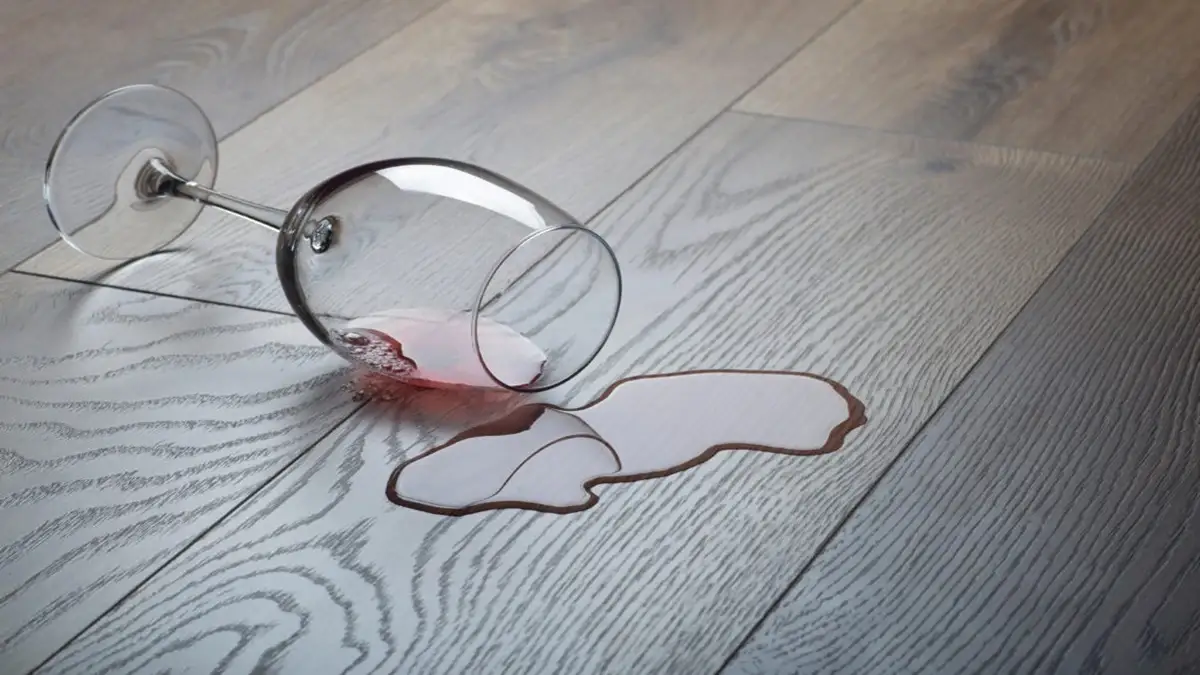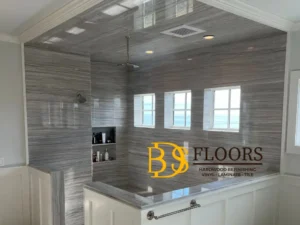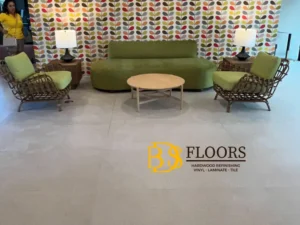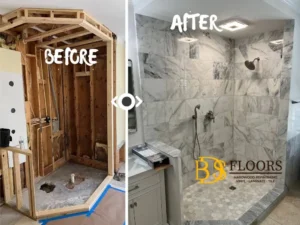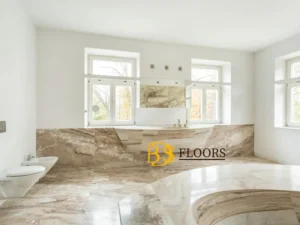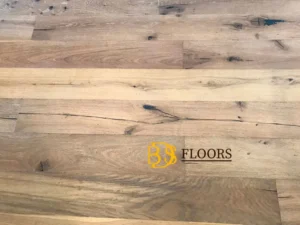Are Vinyl Flooring Waterproof: Vinyl flooring has long been praised for its durability and easy maintenance, making it a popular choice for homeowners. However, one crucial question often arises: Are vinyl floors really waterproof? In this article, we aim to debunk myths and discover the facts about vinyl flooring’s water-resistant properties.
Contrary to common misconceptions, vinyl floors are not entirely impervious to water. Are vinyl flooring waterproof? While they are designed to be water-resistant, it’s essential to understand their limitations to avoid any surprises or damage down the line.
Vinyl flooring typically consists of multiple layers, including a wear layer, a printed design layer, and a core layer. The top wear layer provides excellent protection against spills and moisture, but it’s not entirely waterproof. Prolonged exposure to standing water or excessive moisture can still cause damage in the form of discoloration, swelling, or deterioration of adhesive bonds.
Fortunately, advancements in vinyl flooring technology have led to the development of more robust and waterproof options, such as luxury vinyl planks (LVP) and luxury vinyl tiles (LVT). These types of vinyl flooring utilize innovative materials and construction techniques to provide superior water resistance, making them suitable for areas prone to moisture, like bathrooms and kitchens.
So, while vinyl flooring is water-resistant, it’s essential to choose the right type of vinyl and take proper care to maintain its longevity and aesthetic appeal. Join us as we explore the realities of vinyl flooring’s waterproof capabilities and debunk common myths in the process. Are Vinyl Flooring Waterproof
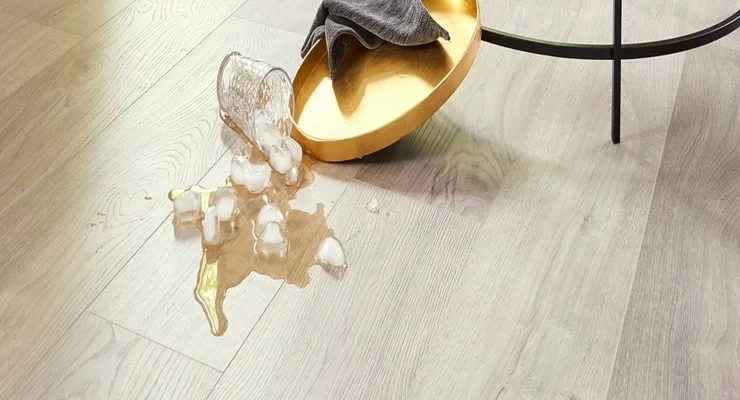
Common misconceptions about vinyl floors and waterproofing
Vinyl flooring has long been praised for its durability and easy maintenance, making it a popular choice for homeowners. However, one crucial question often arises: Are vinyl floors really waterproof? In this article, we aim to debunk myths and discover the facts about vinyl flooring’s water-resistant properties.
Contrary to common misconceptions, vinyl floors are not entirely impervious to water. Are vinyl flooring waterproof? While they are designed to be water-resistant, it’s essential to understand their limitations to avoid any surprises or damage down the line. Are Vinyl Flooring Waterproof
Understanding the different types of vinyl flooring
Many people mistakenly believe that vinyl floors are completely waterproof, leading to unrealistic expectations. It’s important to clarify the reality behind these misconceptions to help homeowners make informed decisions about their flooring choices. Are Vinyl Flooring Waterproof
Firstly, vinyl flooring is often confused with other water-resistant options like ceramic tiles or natural stone. While these materials may be more resistant to water damage, vinyl floors offer their own unique benefits and are an excellent choice for certain areas in the home, Are Vinyl Flooring Waterproof?
Secondly, some individuals assume that all vinyl flooring is created equal in terms of water resistance. However, as we will explore further in this article, there are different types of vinyl flooring, each with varying levels of water resistance. Are Vinyl Flooring Waterproof
Lastly, people tend to think that vinyl floors can withstand any amount of water without consequences. This misconception can lead to neglectful care and maintenance, which may result in damage over time. Understanding the limitations of vinyl flooring is crucial for its longevity and aesthetic appeal, Are Vinyl Flooring Waterproof
The truth about vinyl floors and water resistance: Are Vinyl Flooring Waterproof
To grasp the nuances of vinyl flooring’s water-resistant capabilities, it’s essential to familiarize oneself with the different types available in the market. To grasp the nuances of vinyl flooring’s water-resistant capabilities, it’s essential to familiarize oneself with the different types available in the market. To grasp the nuances of vinyl flooring’s water-resistant capabilities, it’s essential to familiarize oneself with the different types available in the market. To grasp the nuances of vinyl flooring’s water-resistant capabilities, it’s essential to familiarize oneself with the different types available in the market.
Traditional sheet vinyl, for example, has been a staple in many homes for decades. While it offers some water resistance, it’s not as resilient as other options.
However, advancements in vinyl flooring technology have given rise to more robust and waterproof options. Luxury vinyl planks (LVP) and luxury vinyl tiles (LVT) have gained popularity due to their superior water resistance and durability. These types of vinyl flooring utilize innovative materials and construction techniques to provide enhanced protection against moisture.
LVP and LVT are designed to mimic the appearance of natural wood or stone, making them a versatile choice for any room in the house. They offer the best of both worlds – the beauty of hardwood or stone with the added advantage of water resistance.
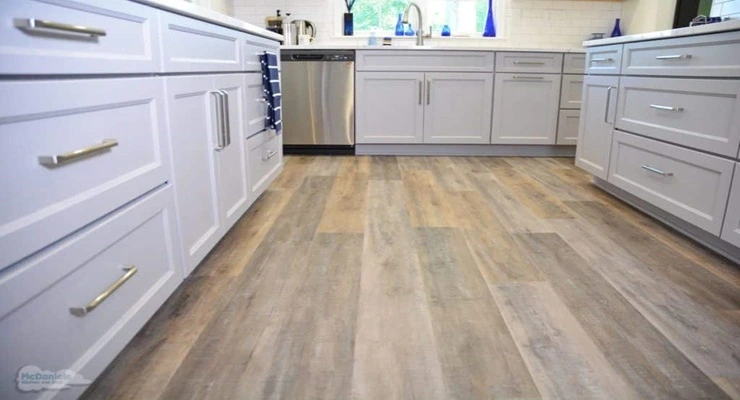
Factors that affect the water resistance of vinyl floors
While vinyl flooring is water-resistant, it’s important to note that it still has limitations. To better understand these limitations, let’s dive deeper into the construction of vinyl floors and how each layer contributes to their overall water resistance.
Vinyl flooring typically consists of multiple layers, including a wear layer, a printed design layer, and a core layer. The top wear layer provides excellent protection against spills and moisture, but it’s not entirely waterproof. Prolonged exposure to standing water or excessive moisture can still cause damage in the form of discoloration, swelling, or deterioration of adhesive bonds.
The printed design layer, which gives vinyl flooring its aesthetic appeal, is also susceptible to water damage. Excessive moisture can cause the design layer to warp or fade, compromising the overall look of the floor.
Lastly, the core layer of vinyl flooring, usually made of PVC or other synthetic materials, provides stability and durability. While it offers some resistance to water, it’s essential to prevent water from seeping through the seams or edges of the floor, as this can lead to damage over time.
How to properly maintain and care for vinyl floors
Several factors can impact the water resistance of vinyl floors, and understanding these factors can help homeowners make informed choices when selecting the right type of vinyl flooring for their specific needs, are Vinyl Flooring Waterproof
Installation is a crucial factor when it comes to determining whether Are Vinyl Flooring Waterproof. Improper installation can result in gaps or loose seams, allowing water to penetrate the floor and cause damage. It’s essential to hire a professional installer or follow manufacturer guidelines to ensure a proper installation.
Another factor to consider when assessing Are Vinyl Flooring Waterproof is the quality of the vinyl flooring itself. Not all vinyl floors are created equal, and some may offer better water resistance than others. It’s advisable to choose vinyl flooring from reputable manufacturers known for their quality and durability.
Additionally, maintenance plays a significant role in the longevity of Are Vinyl Flooring Waterproof’s water resistance. Regular cleaning, avoiding harsh chemicals, and promptly addressing spills or leaks can help preserve the water-resistant properties of vinyl flooring.
Real-life examples and testimonials of vinyl floors and water resistance
Proper care and maintenance are essential to ensure the longevity and water resistance of vinyl flooring. Here are some guidelines to follow to keep your vinyl floors looking their best:
- Regularly sweep or vacuum your vinyl floors to remove dirt and debris that can scratch the surface.
- Clean up spills immediately using a soft cloth or mop to prevent water from seeping into the floor.
- Avoid using abrasive cleaners or harsh chemicals that can damage the wear layer or design layer of the vinyl flooring.
- Use a pH-neutral cleaner specifically formulated for vinyl floors to maintain their appearance and water resistance.
- Place doormats at entryways to prevent dirt, moisture, and grit from being tracked onto the vinyl floors.
- Avoid dragging heavy furniture or sharp objects across the floor, as this can cause scratches or tears in the wear layer.
By following these maintenance tips, homeowners can maximize the water resistance of their vinyl floors and ensure their longevity and aesthetic appeal.
Choosing the right vinyl flooring for your specific needs
To further validate the water-resistant capabilities of vinyl flooring, let’s explore some real-life examples and testimonials from homeowners who have installed vinyl floors in their homes.

